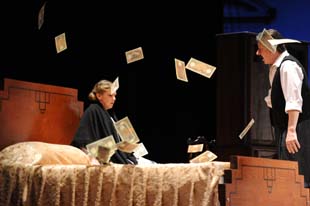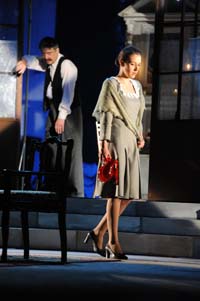


“Naples” was written just before the end of WWII, while Italy was still occupied by the Nazi, the worst tragedy of history was still in place in the streets while De Filippo narrated it.
Yet a contemporary plays, that asks a simple question: what are we ready to lose in order to survive? Is there something more valuable than money? How do we get out of this crisis?
In difficult times people can do anything to survive: to steal, to betray, to cheat, to become a prostitute. And this is understandable. In the occupied Naples, while the British army is bombing and the Nazi one is gathering young people in order to send them to work in Germany, anything is understandable, and, to some extent, forgivable.
This is what happened to Jovine family. They strive to survive. Gennaro is out of work. Amalia organized a little home business and sells coffee, their son, Amedeo sometime steals, Maria Rosaria meet soldiers.
In September 1943, the people of Naples freed their hometown from the Nazi occupation. Then the Us Army came, and with them cigarettes, flour, chewing gums, Am-lire (the Allied new money). But when freedom comes Gennaro is not home. We will learn it later, he was captured and detained in a labor camp in northern Europe. In the meantime Amalia has become an extremely rich shark, an usurer. The black market is prosperous. The house is restored. Amedeo steals cars. Maria Rosaria is a prostitute.
When Gennaro comes back, with the images of the Horror still in his eyes he has to confront the corruption of his family and the serious illness of his younger daughter, Rituccia.
The last line (a very famous one, used in current discourse) is “the night has to pass”.
It refers to the recovery of Rituccia’s health, after the medicine has been found and taken. It refers also to the world that should recover from the horror of war, find again the value of solidarity that makes normal life to come anew.
Some has seen in this last line a sort of optimism. It’s understandable, when the world waits to be reconstructed.
But afterword it became clearer that we are constantly in some crisis, and it’s more important to continue to ask ourselves how we will get out of it, what really maters for us.

Naples, town of Millionaires
by
Eduardo de Filippo
Directed by
Paolo Emilio Landi
Set and Costumes
Santi Migneco
produced by
UFA
Academic Russian Drama Theatre
)